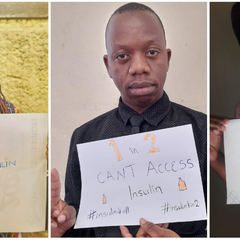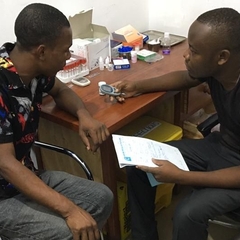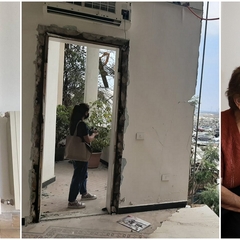Global Stories

Global Advocacy Success Series: Zimbabwe #insulin4all
31 Jan 2022, noon in Global Stories, Interviews by Katie Souris
Established in 2021, the T1International Zimbabwe #insulin4all Chapter, led by Global Chapter Representative Laura Munyoro, has made significant strides in developing the structure of their advocacy network and taking action as community leaders. Read more

Global Advocacy Success Series: JohnPeter, Tanzania
3 Nov 2021, 10:02 a.m. in Global Stories, Interviews by Katie Souris
JohnPeter exemplifies the resilient spirit and patient perseverance that any lifelong advocate must have. He says, ''Being a Global Advocate with T1International has taught me the resilience to fight for what I believe in.'' Read more

Global Advocacy Success Series: Cyrine, Lebanon
31 Aug 2021, 4:19 p.m. in Global Stories, Interviews by Katie Souris
T1International has provided tools and support to ensure Cyrine’s plans are detailed and realistic, and allowed her to connect with other advocates around the world who can offer support and guidance. Read more

Redirecting Guilt into Action
16 Jul 2021, 10:04 a.m. in #insulin4all USA, Global Stories by Elizabeth Roosevelt
It’s crucial that those of us who have access to insulin use our platform and privilege to fight for our community and for the people with diabetes who are solely focused on surviving. We must serve as the voice for the people with diabetes who can’t use their own because they’re bogged down working three jobs and choosing between putting food on the table for their family or insulin. Read more

Underrepresented Communities and Navigating the System
14 Jun 2021, 12:52 p.m. in #insulin4all USA, Global Stories by Alzahrra Almajid
Seven years after my diagnosis my brother was also diagnosed with type 1 diabetes which made the already bad financial burden worse. Although all people with diabetes struggle with how expensive diabetes can be, immigrants and people of color often do not have access to quality health insurance (or any access) so they are less likely to benefit from advanced diabetes technology. As I got older I began to understand how difficult it is to navigate a system that makes it harder for people in underrepresented communities to get adequate care. Read more

From Patient to Medical Student: My Journey with Diabetes Treatment
8 Jun 2021, 9:03 a.m. in Global Stories by Konstantina Taki
Having lived with type 1 diabetes for more than 12 years, I have experienced different aspects of the condition. First of all, as a patient, I approach diabetes from a personal view. I can also understand how the condition affects parents of children with diabetes. It's something new, demanding and difficult to handle. The last five years, as a medical student in Greece, I have seen diabetes from yet another more practical and scientific perspective. Read more

Type 1 Diabetes, Disability, and the Role of Legislation in Advocacy
9 Apr 2021, 11:48 a.m. in Global Stories by Pramita Jasuja
It is through the recognition of injustices and assertion of our rights that we can ensure equal opportunities. T1D advocacy is emerging in India and as a collective we are highlighting these issues. Change is happening. In 2020 in Kerala High Court, a public interest litigation was filed over the issue of including T1D in the list of disabilities and creating a national registry for people with T1D. Read more

Insulin is a Right for Incarcerated People with Diabetes
24 Mar 2021, 9:06 a.m. in #insulin4all USA, Global Stories by Elana Megerian
It is time to recognize that incarcerated people with diabetes are particularly vulnerable to insulin insecurity. #insulin4all is more than a hashtag: It is a rallying call to everyone impacted by insulin inaccessibility, and a mournful cry for all who have lost their lives while insulin remains clearly in view, but cruelly out of reach. It’s a demand for justice for everyone who needs insulin to survive, including incarcerated people with diabetes. We must find ways to meaningfully include and involve this population in our activism. Read more

World Health Organization Consultation for People Living with Diabetes
12 Mar 2021, 4:17 p.m. in Global Stories by Apoorva Gomber
The Global Diabetes Compact (GDC) and the Consultation for People Living with Diabetes, gives me hope that there has been a step towards what we as advocates have long been fighting for. We have asked to have our voices truly included and to be treated like experts when it comes to solving global diabetes problems. We hope this is the start of real action and outcomes. Like Dr. Bente shared, it is time to co-create with WHO and move forward by holding their efforts accountable. Read more

Dexcom G6: Available to who?
17 Feb 2021, 10:50 a.m. in #insulin4all USA, Global Stories by Tracy Ramey
But again, we must ask: who is this available to? This technology requires a prescription, and we know that Black and Brown communities are being offered access at much lower rates than their white peers. I am a Black woman with a family history of type 2 that puts me at greater risk of developing it. Interestingly, despite having several family members with type 2 diabetes, my child with type 1 is the first person that has CGM technology, and that was because I pushed for it. Read more